Embryonic Testing, Dignity, and Freedom of Choice: A Report
VerifiedAdded on 2023/01/17
|7
|1498
|82
Report
AI Summary
This report explores the ethical and moral implications of embryonic testing, specifically focusing on preimplantation genetic diagnosis (PGD) and its relationship to dignity and freedom of choice. The report provides background on the advancements in scientific technologies, particularly in relation to the human genome and genetic disorders, and the ability to test for genetic diseases. The report discusses the process of PGD, which allows for the selection of embryos based on their genetic suitability, and the advantages of this process, such as preventing genetic disorders and allowing for gender selection in certain cultural contexts. The report then delves into the concept of human dignity, emphasizing the inherent moral value of each individual and the moral rights that stem from it, including the right to life. The report argues that embryonic testing, while offering freedom of choice to couples, can potentially violate the dignity of the embryo by creating and destroying life, and by denying embryos the opportunity to compete naturally. The conclusion supports embryonic testing for the selection of desirable genetic traits, while acknowledging the ethical complexities and the differing perspectives on when life begins.
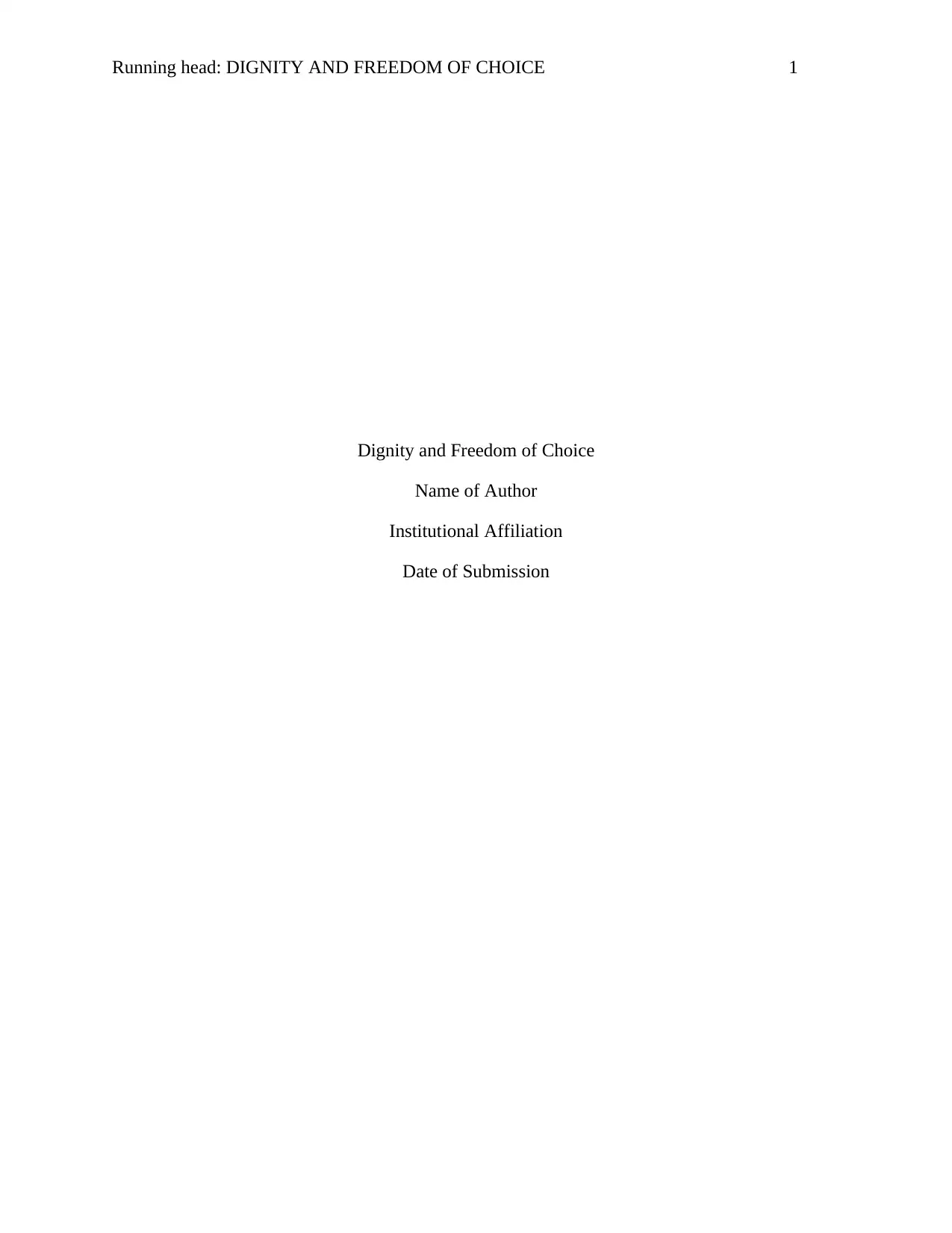
Running head: DIGNITY AND FREEDOM OF CHOICE 1
Dignity and Freedom of Choice
Name of Author
Institutional Affiliation
Date of Submission
Dignity and Freedom of Choice
Name of Author
Institutional Affiliation
Date of Submission
Paraphrase This Document
Need a fresh take? Get an instant paraphrase of this document with our AI Paraphraser
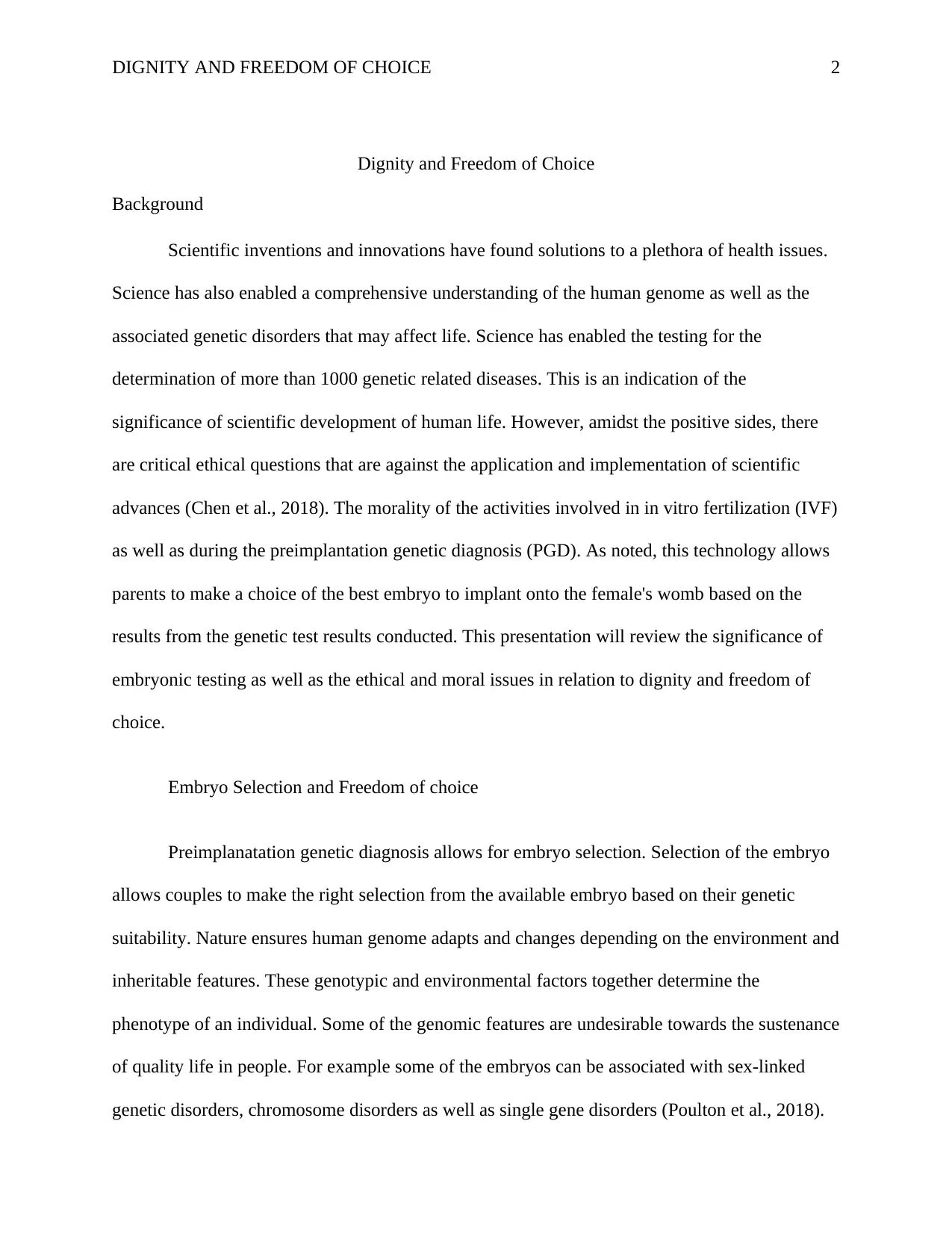
DIGNITY AND FREEDOM OF CHOICE 2
Dignity and Freedom of Choice
Background
Scientific inventions and innovations have found solutions to a plethora of health issues.
Science has also enabled a comprehensive understanding of the human genome as well as the
associated genetic disorders that may affect life. Science has enabled the testing for the
determination of more than 1000 genetic related diseases. This is an indication of the
significance of scientific development of human life. However, amidst the positive sides, there
are critical ethical questions that are against the application and implementation of scientific
advances (Chen et al., 2018). The morality of the activities involved in in vitro fertilization (IVF)
as well as during the preimplantation genetic diagnosis (PGD). As noted, this technology allows
parents to make a choice of the best embryo to implant onto the female's womb based on the
results from the genetic test results conducted. This presentation will review the significance of
embryonic testing as well as the ethical and moral issues in relation to dignity and freedom of
choice.
Embryo Selection and Freedom of choice
Preimplanatation genetic diagnosis allows for embryo selection. Selection of the embryo
allows couples to make the right selection from the available embryo based on their genetic
suitability. Nature ensures human genome adapts and changes depending on the environment and
inheritable features. These genotypic and environmental factors together determine the
phenotype of an individual. Some of the genomic features are undesirable towards the sustenance
of quality life in people. For example some of the embryos can be associated with sex-linked
genetic disorders, chromosome disorders as well as single gene disorders (Poulton et al., 2018).
Dignity and Freedom of Choice
Background
Scientific inventions and innovations have found solutions to a plethora of health issues.
Science has also enabled a comprehensive understanding of the human genome as well as the
associated genetic disorders that may affect life. Science has enabled the testing for the
determination of more than 1000 genetic related diseases. This is an indication of the
significance of scientific development of human life. However, amidst the positive sides, there
are critical ethical questions that are against the application and implementation of scientific
advances (Chen et al., 2018). The morality of the activities involved in in vitro fertilization (IVF)
as well as during the preimplantation genetic diagnosis (PGD). As noted, this technology allows
parents to make a choice of the best embryo to implant onto the female's womb based on the
results from the genetic test results conducted. This presentation will review the significance of
embryonic testing as well as the ethical and moral issues in relation to dignity and freedom of
choice.
Embryo Selection and Freedom of choice
Preimplanatation genetic diagnosis allows for embryo selection. Selection of the embryo
allows couples to make the right selection from the available embryo based on their genetic
suitability. Nature ensures human genome adapts and changes depending on the environment and
inheritable features. These genotypic and environmental factors together determine the
phenotype of an individual. Some of the genomic features are undesirable towards the sustenance
of quality life in people. For example some of the embryos can be associated with sex-linked
genetic disorders, chromosome disorders as well as single gene disorders (Poulton et al., 2018).
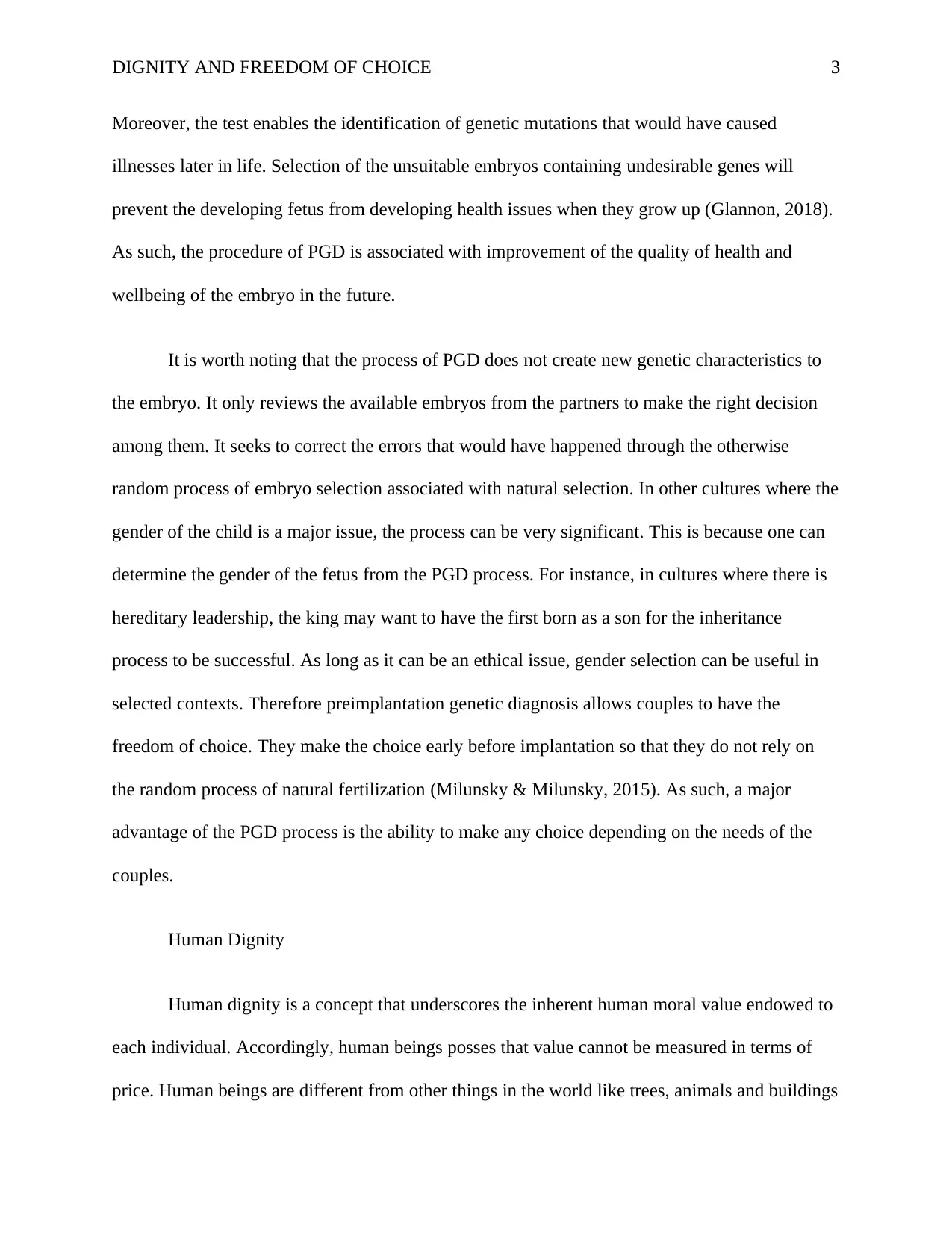
DIGNITY AND FREEDOM OF CHOICE 3
Moreover, the test enables the identification of genetic mutations that would have caused
illnesses later in life. Selection of the unsuitable embryos containing undesirable genes will
prevent the developing fetus from developing health issues when they grow up (Glannon, 2018).
As such, the procedure of PGD is associated with improvement of the quality of health and
wellbeing of the embryo in the future.
It is worth noting that the process of PGD does not create new genetic characteristics to
the embryo. It only reviews the available embryos from the partners to make the right decision
among them. It seeks to correct the errors that would have happened through the otherwise
random process of embryo selection associated with natural selection. In other cultures where the
gender of the child is a major issue, the process can be very significant. This is because one can
determine the gender of the fetus from the PGD process. For instance, in cultures where there is
hereditary leadership, the king may want to have the first born as a son for the inheritance
process to be successful. As long as it can be an ethical issue, gender selection can be useful in
selected contexts. Therefore preimplantation genetic diagnosis allows couples to have the
freedom of choice. They make the choice early before implantation so that they do not rely on
the random process of natural fertilization (Milunsky & Milunsky, 2015). As such, a major
advantage of the PGD process is the ability to make any choice depending on the needs of the
couples.
Human Dignity
Human dignity is a concept that underscores the inherent human moral value endowed to
each individual. Accordingly, human beings posses that value cannot be measured in terms of
price. Human beings are different from other things in the world like trees, animals and buildings
Moreover, the test enables the identification of genetic mutations that would have caused
illnesses later in life. Selection of the unsuitable embryos containing undesirable genes will
prevent the developing fetus from developing health issues when they grow up (Glannon, 2018).
As such, the procedure of PGD is associated with improvement of the quality of health and
wellbeing of the embryo in the future.
It is worth noting that the process of PGD does not create new genetic characteristics to
the embryo. It only reviews the available embryos from the partners to make the right decision
among them. It seeks to correct the errors that would have happened through the otherwise
random process of embryo selection associated with natural selection. In other cultures where the
gender of the child is a major issue, the process can be very significant. This is because one can
determine the gender of the fetus from the PGD process. For instance, in cultures where there is
hereditary leadership, the king may want to have the first born as a son for the inheritance
process to be successful. As long as it can be an ethical issue, gender selection can be useful in
selected contexts. Therefore preimplantation genetic diagnosis allows couples to have the
freedom of choice. They make the choice early before implantation so that they do not rely on
the random process of natural fertilization (Milunsky & Milunsky, 2015). As such, a major
advantage of the PGD process is the ability to make any choice depending on the needs of the
couples.
Human Dignity
Human dignity is a concept that underscores the inherent human moral value endowed to
each individual. Accordingly, human beings posses that value cannot be measured in terms of
price. Human beings are different from other things in the world like trees, animals and buildings
⊘ This is a preview!⊘
Do you want full access?
Subscribe today to unlock all pages.

Trusted by 1+ million students worldwide
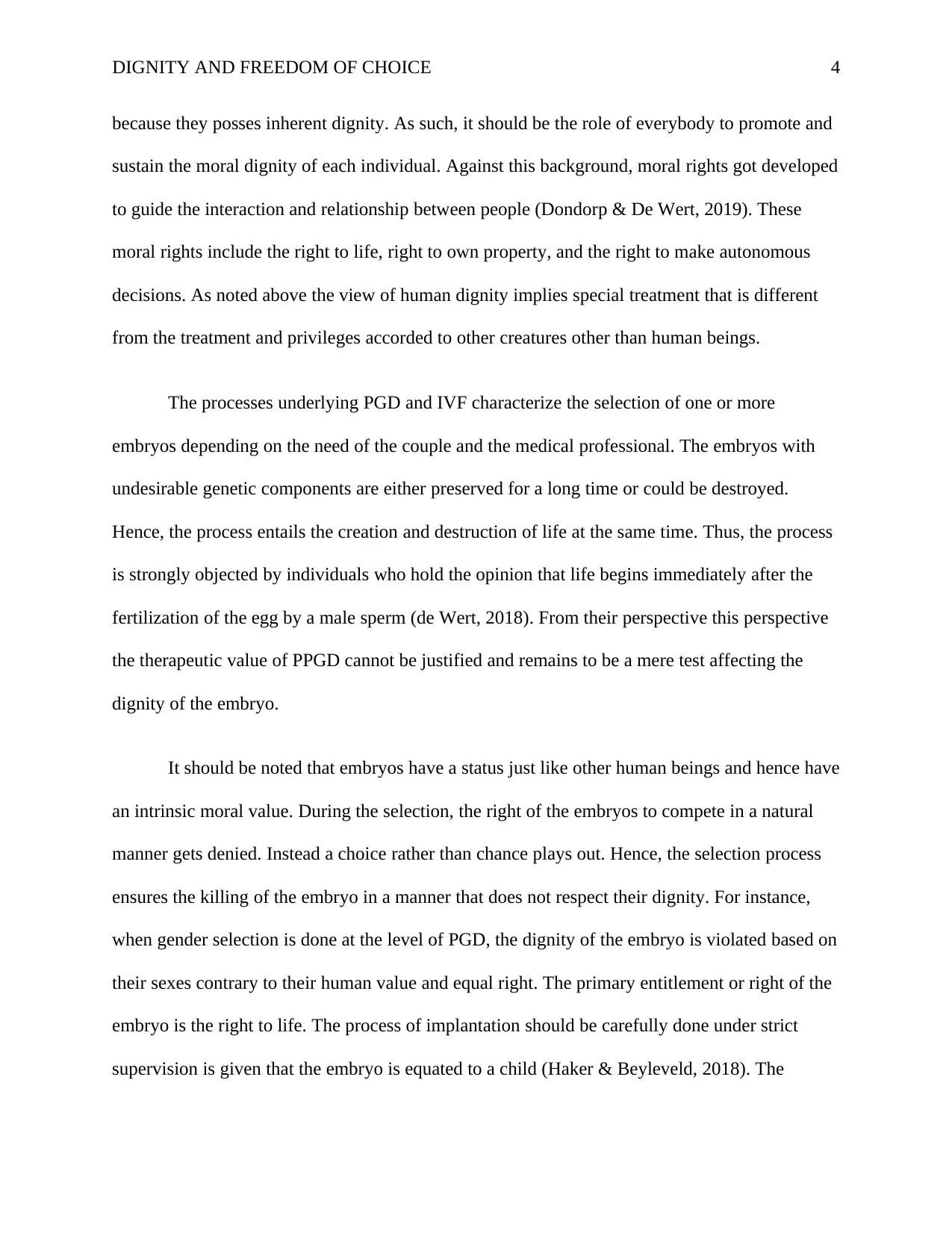
DIGNITY AND FREEDOM OF CHOICE 4
because they posses inherent dignity. As such, it should be the role of everybody to promote and
sustain the moral dignity of each individual. Against this background, moral rights got developed
to guide the interaction and relationship between people (Dondorp & De Wert, 2019). These
moral rights include the right to life, right to own property, and the right to make autonomous
decisions. As noted above the view of human dignity implies special treatment that is different
from the treatment and privileges accorded to other creatures other than human beings.
The processes underlying PGD and IVF characterize the selection of one or more
embryos depending on the need of the couple and the medical professional. The embryos with
undesirable genetic components are either preserved for a long time or could be destroyed.
Hence, the process entails the creation and destruction of life at the same time. Thus, the process
is strongly objected by individuals who hold the opinion that life begins immediately after the
fertilization of the egg by a male sperm (de Wert, 2018). From their perspective this perspective
the therapeutic value of PPGD cannot be justified and remains to be a mere test affecting the
dignity of the embryo.
It should be noted that embryos have a status just like other human beings and hence have
an intrinsic moral value. During the selection, the right of the embryos to compete in a natural
manner gets denied. Instead a choice rather than chance plays out. Hence, the selection process
ensures the killing of the embryo in a manner that does not respect their dignity. For instance,
when gender selection is done at the level of PGD, the dignity of the embryo is violated based on
their sexes contrary to their human value and equal right. The primary entitlement or right of the
embryo is the right to life. The process of implantation should be carefully done under strict
supervision is given that the embryo is equated to a child (Haker & Beyleveld, 2018). The
because they posses inherent dignity. As such, it should be the role of everybody to promote and
sustain the moral dignity of each individual. Against this background, moral rights got developed
to guide the interaction and relationship between people (Dondorp & De Wert, 2019). These
moral rights include the right to life, right to own property, and the right to make autonomous
decisions. As noted above the view of human dignity implies special treatment that is different
from the treatment and privileges accorded to other creatures other than human beings.
The processes underlying PGD and IVF characterize the selection of one or more
embryos depending on the need of the couple and the medical professional. The embryos with
undesirable genetic components are either preserved for a long time or could be destroyed.
Hence, the process entails the creation and destruction of life at the same time. Thus, the process
is strongly objected by individuals who hold the opinion that life begins immediately after the
fertilization of the egg by a male sperm (de Wert, 2018). From their perspective this perspective
the therapeutic value of PPGD cannot be justified and remains to be a mere test affecting the
dignity of the embryo.
It should be noted that embryos have a status just like other human beings and hence have
an intrinsic moral value. During the selection, the right of the embryos to compete in a natural
manner gets denied. Instead a choice rather than chance plays out. Hence, the selection process
ensures the killing of the embryo in a manner that does not respect their dignity. For instance,
when gender selection is done at the level of PGD, the dignity of the embryo is violated based on
their sexes contrary to their human value and equal right. The primary entitlement or right of the
embryo is the right to life. The process of implantation should be carefully done under strict
supervision is given that the embryo is equated to a child (Haker & Beyleveld, 2018). The
Paraphrase This Document
Need a fresh take? Get an instant paraphrase of this document with our AI Paraphraser
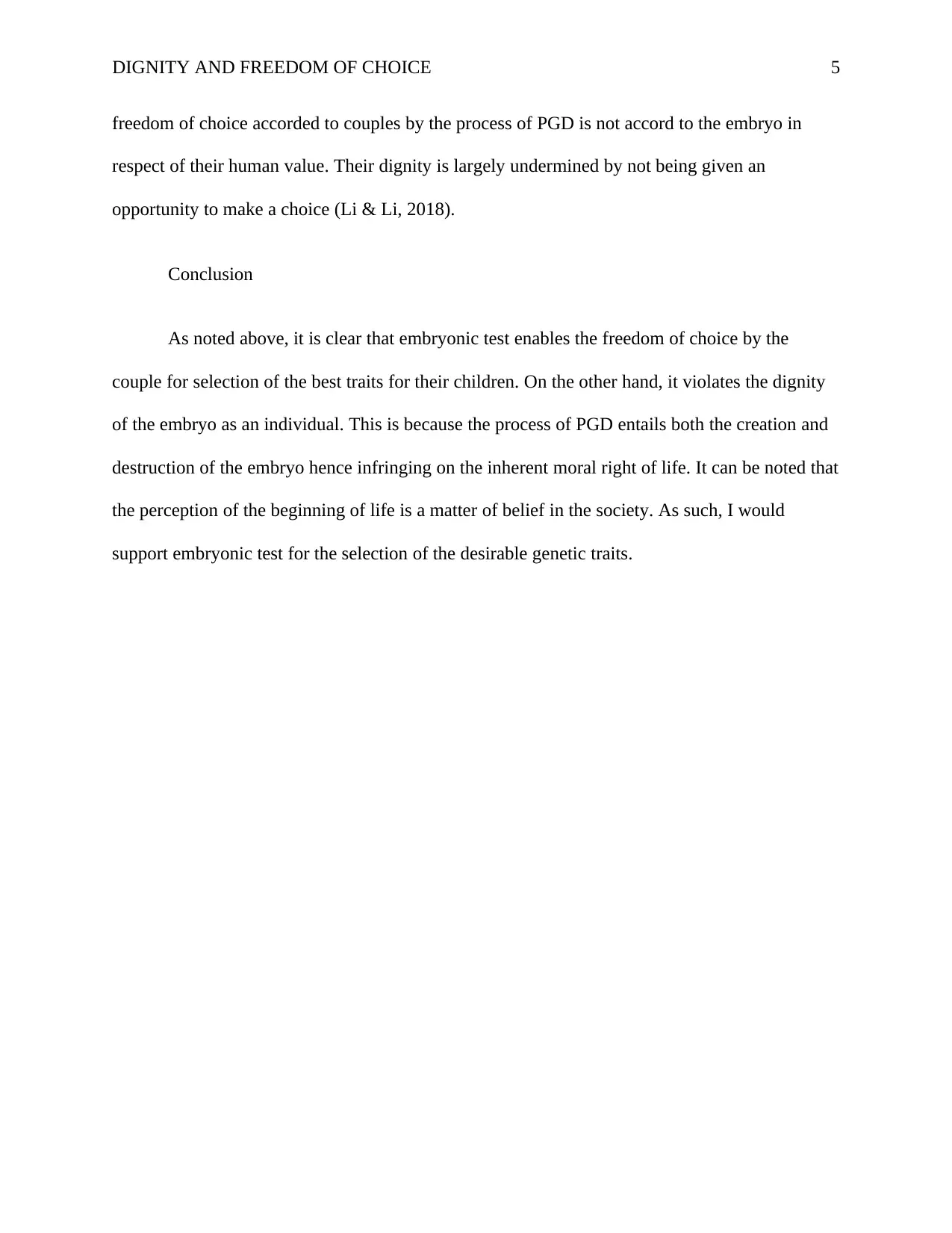
DIGNITY AND FREEDOM OF CHOICE 5
freedom of choice accorded to couples by the process of PGD is not accord to the embryo in
respect of their human value. Their dignity is largely undermined by not being given an
opportunity to make a choice (Li & Li, 2018).
Conclusion
As noted above, it is clear that embryonic test enables the freedom of choice by the
couple for selection of the best traits for their children. On the other hand, it violates the dignity
of the embryo as an individual. This is because the process of PGD entails both the creation and
destruction of the embryo hence infringing on the inherent moral right of life. It can be noted that
the perception of the beginning of life is a matter of belief in the society. As such, I would
support embryonic test for the selection of the desirable genetic traits.
freedom of choice accorded to couples by the process of PGD is not accord to the embryo in
respect of their human value. Their dignity is largely undermined by not being given an
opportunity to make a choice (Li & Li, 2018).
Conclusion
As noted above, it is clear that embryonic test enables the freedom of choice by the
couple for selection of the best traits for their children. On the other hand, it violates the dignity
of the embryo as an individual. This is because the process of PGD entails both the creation and
destruction of the embryo hence infringing on the inherent moral right of life. It can be noted that
the perception of the beginning of life is a matter of belief in the society. As such, I would
support embryonic test for the selection of the desirable genetic traits.
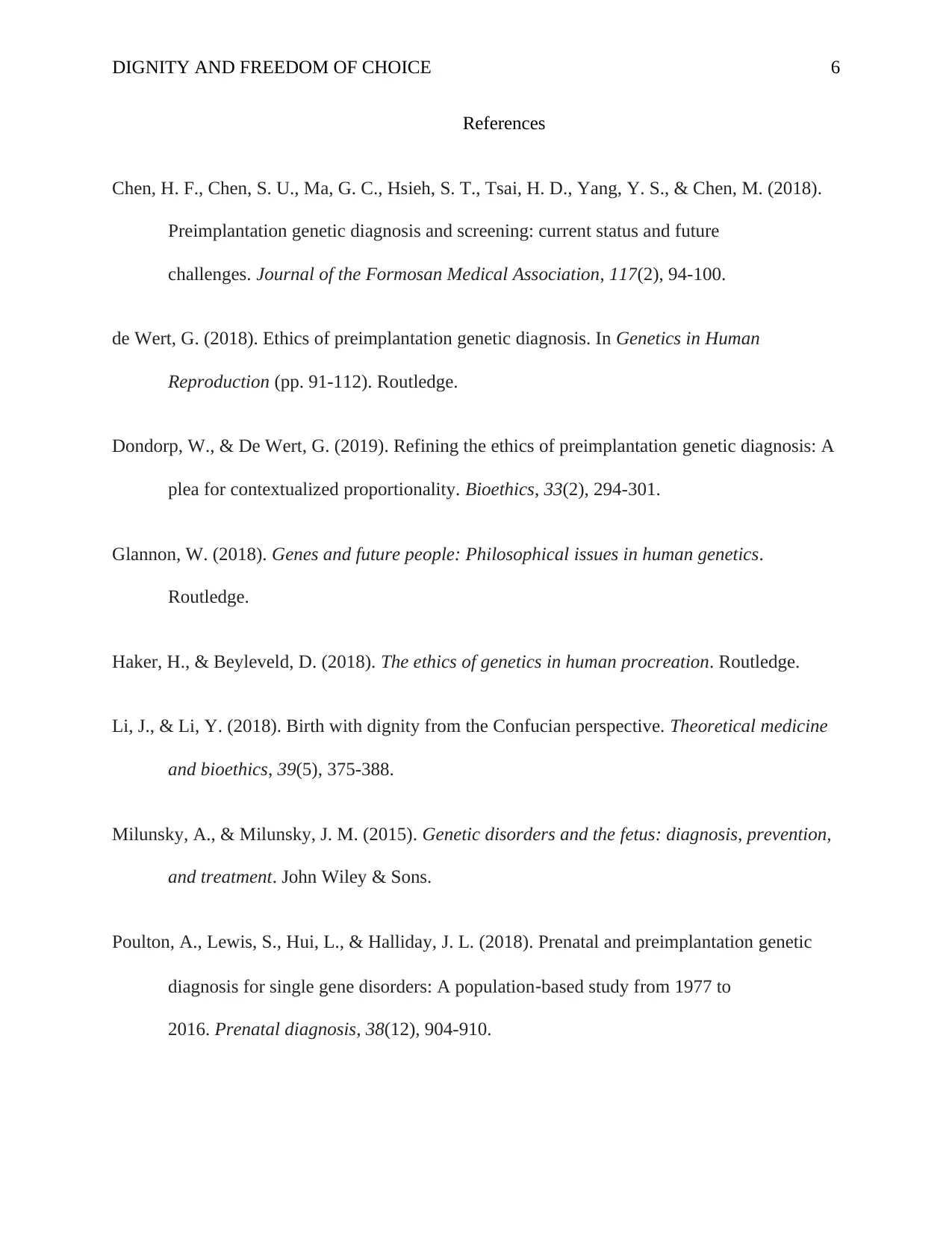
DIGNITY AND FREEDOM OF CHOICE 6
References
Chen, H. F., Chen, S. U., Ma, G. C., Hsieh, S. T., Tsai, H. D., Yang, Y. S., & Chen, M. (2018).
Preimplantation genetic diagnosis and screening: current status and future
challenges. Journal of the Formosan Medical Association, 117(2), 94-100.
de Wert, G. (2018). Ethics of preimplantation genetic diagnosis. In Genetics in Human
Reproduction (pp. 91-112). Routledge.
Dondorp, W., & De Wert, G. (2019). Refining the ethics of preimplantation genetic diagnosis: A
plea for contextualized proportionality. Bioethics, 33(2), 294-301.
Glannon, W. (2018). Genes and future people: Philosophical issues in human genetics.
Routledge.
Haker, H., & Beyleveld, D. (2018). The ethics of genetics in human procreation. Routledge.
Li, J., & Li, Y. (2018). Birth with dignity from the Confucian perspective. Theoretical medicine
and bioethics, 39(5), 375-388.
Milunsky, A., & Milunsky, J. M. (2015). Genetic disorders and the fetus: diagnosis, prevention,
and treatment. John Wiley & Sons.
Poulton, A., Lewis, S., Hui, L., & Halliday, J. L. (2018). Prenatal and preimplantation genetic
diagnosis for single gene disorders: A population‐based study from 1977 to
2016. Prenatal diagnosis, 38(12), 904-910.
References
Chen, H. F., Chen, S. U., Ma, G. C., Hsieh, S. T., Tsai, H. D., Yang, Y. S., & Chen, M. (2018).
Preimplantation genetic diagnosis and screening: current status and future
challenges. Journal of the Formosan Medical Association, 117(2), 94-100.
de Wert, G. (2018). Ethics of preimplantation genetic diagnosis. In Genetics in Human
Reproduction (pp. 91-112). Routledge.
Dondorp, W., & De Wert, G. (2019). Refining the ethics of preimplantation genetic diagnosis: A
plea for contextualized proportionality. Bioethics, 33(2), 294-301.
Glannon, W. (2018). Genes and future people: Philosophical issues in human genetics.
Routledge.
Haker, H., & Beyleveld, D. (2018). The ethics of genetics in human procreation. Routledge.
Li, J., & Li, Y. (2018). Birth with dignity from the Confucian perspective. Theoretical medicine
and bioethics, 39(5), 375-388.
Milunsky, A., & Milunsky, J. M. (2015). Genetic disorders and the fetus: diagnosis, prevention,
and treatment. John Wiley & Sons.
Poulton, A., Lewis, S., Hui, L., & Halliday, J. L. (2018). Prenatal and preimplantation genetic
diagnosis for single gene disorders: A population‐based study from 1977 to
2016. Prenatal diagnosis, 38(12), 904-910.
⊘ This is a preview!⊘
Do you want full access?
Subscribe today to unlock all pages.

Trusted by 1+ million students worldwide

DIGNITY AND FREEDOM OF CHOICE 7
1 out of 7
Related Documents
Your All-in-One AI-Powered Toolkit for Academic Success.
+13062052269
info@desklib.com
Available 24*7 on WhatsApp / Email
![[object Object]](/_next/static/media/star-bottom.7253800d.svg)
Unlock your academic potential
Copyright © 2020–2025 A2Z Services. All Rights Reserved. Developed and managed by ZUCOL.



